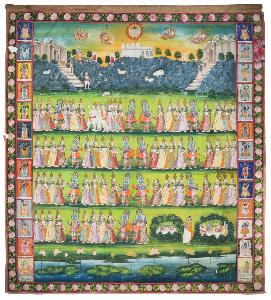Khubiram Gopilal
Khubiram Gopilal
Place: Nathdwara
Born: 1891
Death: 1970
Biography:
Early Life and Career
Khubiram Gopilal, an Indian artist, was born in 1891 in Nathdwara, India, and passed away in 1970. His artistic journey began with a focus on portrait painting, specifically the style known as Manorath paintings. These paintings were created for pilgrims visiting the temple at Nathdwara as mementos of their worship of the young Krishna.
Artistic Style and Significance
Gopilal's work is characterized by its unique approach to portraiture, blending traditional Indian elements with photographic techniques. As a painter, studio photographer, and collagist, he specialized in capturing the essence of his subjects. His version of Lord Shiva's portrait, released in 1930, is a notable example of his skill.
Notable Works
* Maha Daan Leela or the 'festival of the toll' in Nathdwara: A large pichwai showcasing Gopilal's mastery of capturing the spirit of Indian culture. * Featured in Monash Gallery of Art and Google Arts & Culture
Legacy and Impact
Gopilal's contributions to Indian art are undeniable. His work has been featured in prominent galleries, including the National Gallery of Modern Art (India), highlighting his influence on modern Indian painting.
- His unique style has inspired generations of artists, both in India and globally.
- Gopilal's work serves as a bridge between traditional Indian art forms and modern photographic techniques.
- As an artist, he played a crucial role in promoting cultural diplomacy through his art.
Conclusion
Khubiram Gopilal's artistic legacy is a testament to the power of Indian art. Through his Manorath paintings, he has left an indelible mark on the world of art, inspiring future generations with his unique blend of traditional and modern techniques. Recommended Reading: * Pablo Picasso: The fool (Symbolism, Watercolour) * Sandra Ramos: A Cuban contemporary painter exploring nationality, gender, and identity.


